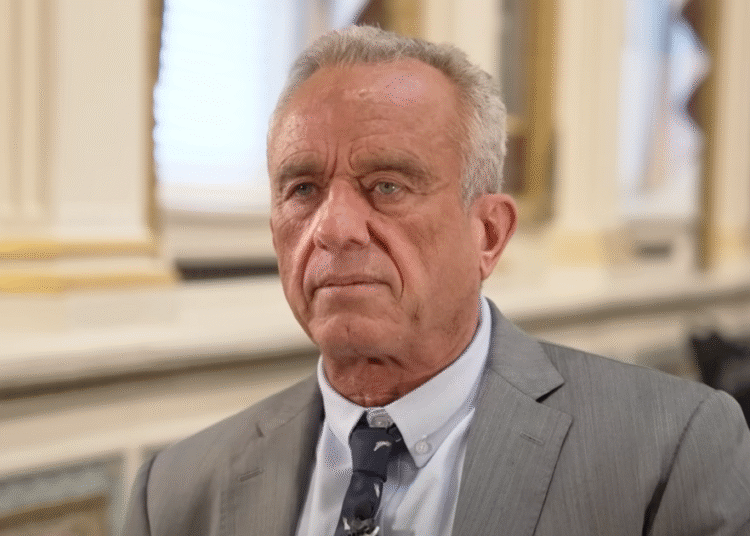Latest
RFK Jr Says Studies to Identify Causes of Autism Could be Completed by March 2026

Independent presidential candidate Robert F. Kennedy Jr. has spoken about a potential timeline for research into autism causes. According to him, certain studies could be completed as early as March 2026, offering possible new insights into the condition.
U.S. Health and Human Services Secretary Robert F. Kennedy Jr. has announced that major studies aimed at uncovering the causes of autism could be completed by March 2026. He shared the update during an interview on The Source with Kaitlan Collins, referencing the progress made under the Making America Healthy Again (MAHA) initiative.
According to Kennedy, some of the studies are expected to finish as early as September 2025, and they will largely consist of replication studies—research that repeats previous studies to confirm their findings. “These studies will mainly be replication studies of studies that have already been done,” he explained.
In addition to validating past research, Kennedy revealed that 15 scientific teams will be commissioned to launch new investigations, with grants expected to go out within three weeks. He emphasized that this marks a new, more focused phase of autism research aimed at producing scientifically definitive outcomes.
“We’re going to begin to have a lot of information by September,” he noted, while clarifying that the research will continue beyond that point to reach clear and comprehensive conclusions. “We’re not going to stop the studies in September. We’re going to be definitive,” he added.
Kennedy has made autism a central issue, highlighting the alarming rise in diagnoses across the United States. According to recent CDC data, 1 in 31 children is now diagnosed with autism. The findings, based on 2022 data from 16 U.S. sites, also show significant geographic variation, with rates ranging from 9.7 per 1,000 in Laredo, Texas, to 53.1 per 1,000 in California.
The data also showed that autism is 3.4 times more common in boys than girls, and rates are higher among Asian, Pacific Islander, American Indian, Black, and Hispanic children compared to White children.
Interestingly, the CDC did not find a strong connection between autism and neighborhood income in most sites, although five locations did show higher rates in lower-income areas.
In April, Kennedy called autism an “epidemic” and accused parts of the scientific community of “epidemic denial.” He urged researchers and policymakers to take the issue seriously, saying, “All you have to do is start reading a little science.”
The MAHA Commission’s recent report backs Kennedy’s concerns, drawing attention to the rise in chronic childhood illnesses and referencing environmental tracking data from the EPA. While certain pollutants have decreased over time, the report says exposure to chemicals in food, water, and air has gone up, and no country truly understands how these exposures affect children’s health long-term.
Kennedy has positioned the MAHA effort as a corrective to years of regulatory failure, insisting that future public policy must be based on strong scientific evidence to ensure the well-being of the next generation.
Scroll down to leave a comment and share your thoughts.
-

 Latest6 months ago
Latest6 months ago𝗔𝗹𝗹 𝗼𝗳 𝘁𝗵𝗲 𝗻𝗮𝗺𝗲𝘀 𝗺𝗲𝗻𝘁𝗶𝗼𝗻𝗲𝗱 𝗶𝗻 𝘁𝗵𝗲 𝗻𝗲𝘄 𝗝𝗲𝗳𝗳𝗿𝗲𝘆 𝗘𝗽𝘀𝘁𝗲𝗶𝗻 𝗱𝗼𝗰𝘂𝗺𝗲𝗻𝘁𝘀.
-

 Latest8 months ago
Latest8 months agoParis Hilton and Kanye Connected? “They Held Me Down, Spread My Legs…” [WARNING: Graphic]
-

 Latest7 months ago
Latest7 months agoHistoric Verdict Rocks America — Donald Trump Officially Convicted in a Turning Point No One Saw Coming
-

 Latest8 months ago
Latest8 months agoAlex Jones Exposes What’s Going On With Dan Bongino
-

 Latest5 months ago
Latest5 months agoProminent Republican Politician SWITCHES To Democrat Party
-

 Latest5 months ago
Latest5 months agoBREAKING: Supreme Court Responds to Gov. Greg Abbott’s Emergency Petition to REMOVE Runaway Democrat Leader
-

 Latest5 months ago
Latest5 months agoBOMBSHELL: President Trump Confirms Joe Biden Dead Since 2020!
-

 Latest6 months ago
Latest6 months agoBREAKING: President Trump drops a new message for America — and it changes everything.
